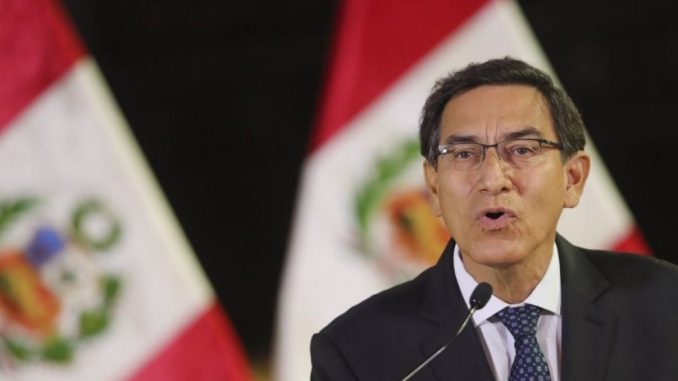
The president of Peru, Martin Vizcarra, announced this Monday the “constitutional” dissolution of Congress and called for elections to elect a new parliament.
However, hours later, Congress suspended him from his presidential functions for twelve months for “temporary incapacity” and swore vicepresident Mercedes Araoz as “president in charge” of the country.
Vizcarra, -we must remember- took office after the resignation of former president Kuchinsky, now incarcerated for corruption acts. He announced his decision of dissolving Congress and calling legislative elections for January 26 using a constitutional norm that allowes him to do so if the chamber does not trust him to make changes in the selection process of candidates to the Constitutional Court.
The government raised this trust issue – for the third in a year – because it considered that the selection process was not transparent and did not guarantee the division of powers in the nation.
However, on Monday the Congress – dominated by the Fujimorist majority and its allies – decided to continue with the predetermined agenda of the session: this means, first choosing the members of the Constitutional Court and then analysing the trust issue raised by the Executive.
After the designation of a new magistrate for the Court – one of the six members that must be replaced because of the end of their term – Vizcarra announced the dissolution of Congress and the call for legislative elections. After the announcement, the heads of the Army and the National Police met with Vizcarra to show “their complete support of the constitutional order and the president”.
This crisis is a new expression of a process that already imprisoned three former presidents and exiled one, while another has committed suicide, and it is the greatest demonstration of the complete decadence of the institutions, while the regime still maintains the Fujimorist constitution.
Vizcarra has accused Fuerza Popular, led by Keiko Fujimori – who is in preventive prison for accusations of money laundering – of trying to use the democratic institutions for their personal benefit.
For now, the historical centre of Lima and other cities of the country became the scenario of manifestations of the citizenship in support of Vizcarra´s announcement, expressing the discredit and the restlessness of the people in this situation. “They must all go” can be heard in the capital of the city and other important urban centres like Arequipa, Piura or Tacna.
We understand that the Peruvian people will not get out of the crisis by the hand of the corrupt Congress or by the measures of Vizcarra, a classic neoliberal who only uses people´s rejection of the Congress to position himself better in a hypothetical election.
Socialists know that it will only be possible to advance in the resolution of the crisis if the people are in charge of the immediate tasks. There is no way out for Peru without the call to a constituent assembly that allows the people to discuss everything, how and with whom to define the bases so, for once, those who never governed, the workers and peasants with the people, can govern.
Peru once again shows that bourgeois institutions do nothing but defend the interests of the ruling class. Organization and mobilization are the best antidote to avoid falling into the trap that Vizcarra and Congress representatives try to drive the Peruvian people into.
Alberto Giovanelli








